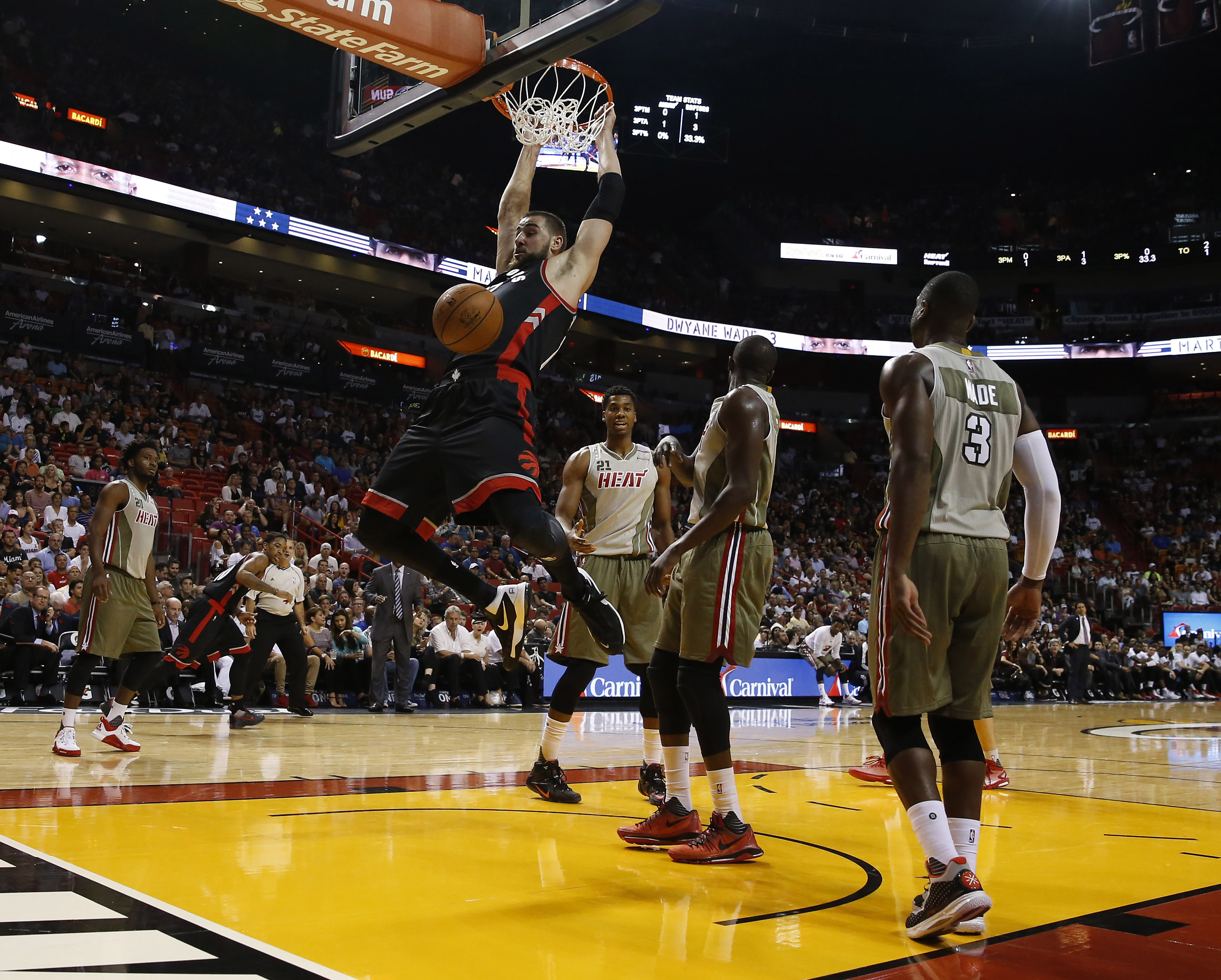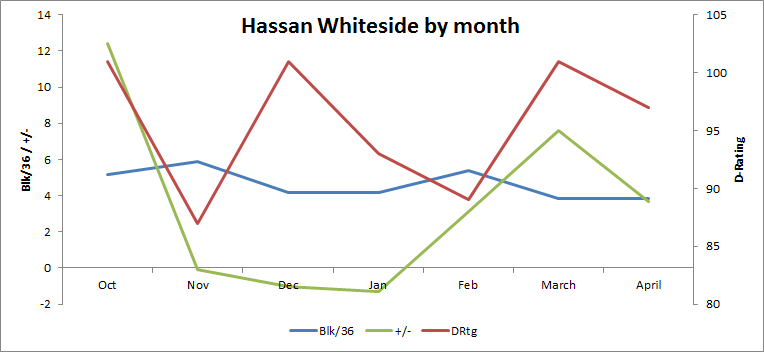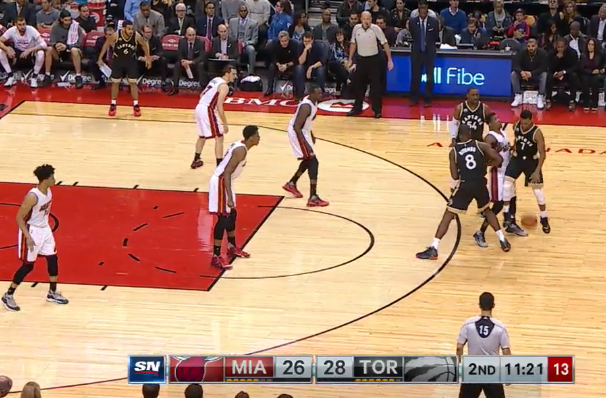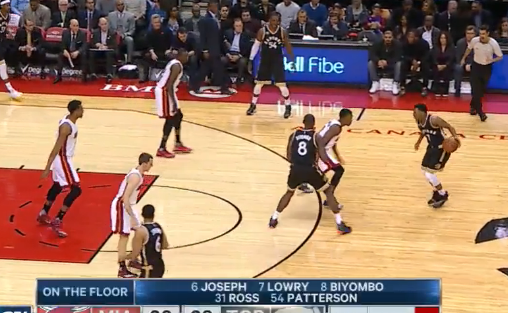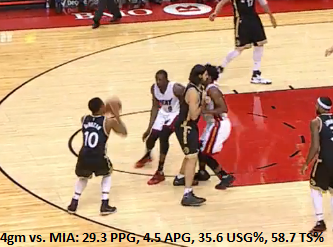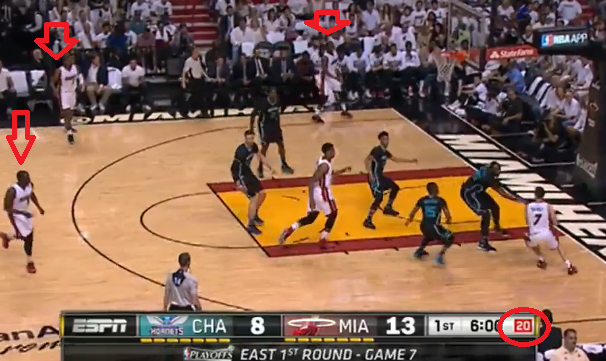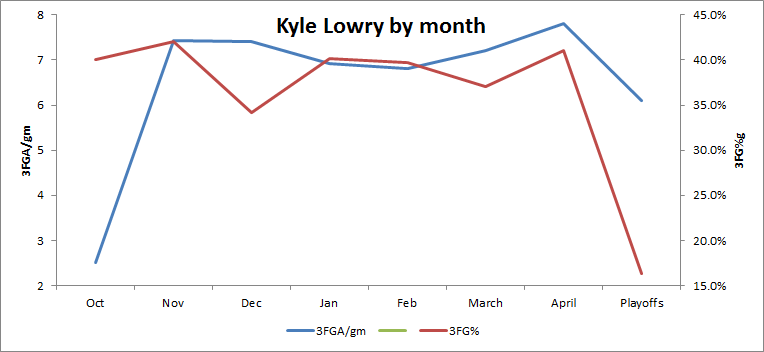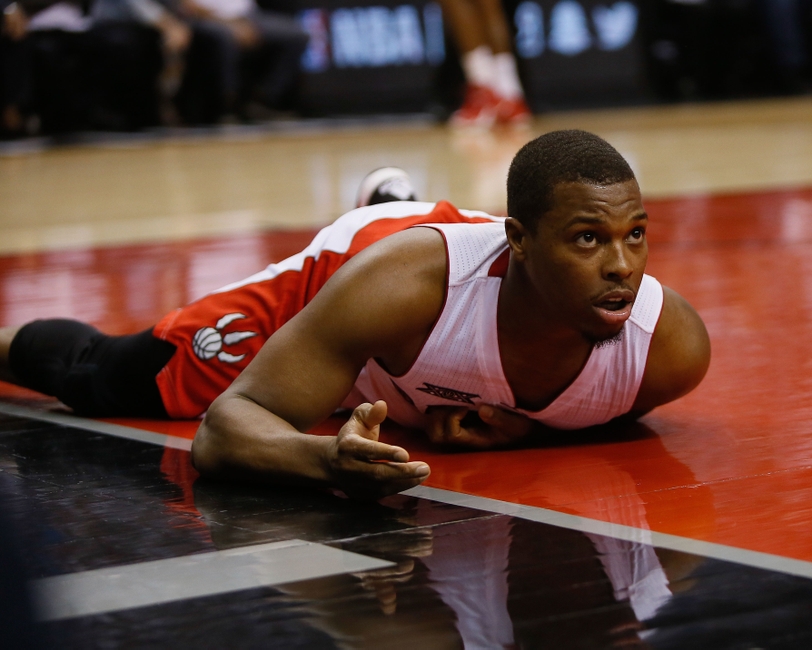With a quick turnaround time between series, the opportunity to get to know the Miami Heat as intimately as we grew to know the Indiana Pacers hasn’t really been there. Imagine how the Toronto Raptors must feel with a single day to prepare for a new opponent, and likewise for the Heat. Unlike those teams, though, we have friends family, or at least, people who are kind enough to take time out of their scheduled to help us calibrate ahead of the series.
Like we did ahead of Raptors-Pacers, we reached out to those with a deeper knowledge of the Heat (and generally smarter than us) to help give us an outside perspective on Raptors-Heat.
Helping us out are Zach Harper of CBS Sports, who spent a chunk of the season as an AAA regular, and our own Joshua Priemski, who doubles as the editor of At The Hive and hence just watched the Heat for seven consecutive games. Those are necessary follows for the series and just in general, and I’m incredibly grateful they gave us their time and these quality answers.
Hassan Whiteside is an absolute terror around the rim, blocking roughly 10 percent of opponent 2-point attempts when he’s on the floor. For a while, that didn’t come with an improved defense for the team with him out there, and they seemed like empty blocks, or blocks at the expense of staying within the scheme. That seemed to change as the year went on, with Whiteside looking like a menace in real and statistical terms. What changed in his approach, or how did the Heat better utilize him?
Zach Harper: First thing they did was move him into more of a Sixth Man role. With him coming off the bench, he saw more time against second units with less talent. That was a good confidence builder for him because it allowed him to make mistakes within coverages without being overwhelmed by the consequences with the worse players. He also started just seeing the floor and situations better, which helped him make better decisions. So when the better players started getting back into the game and he was out there, Whiteside was in a rhythm and not asked to figure it out on the fly from the start of the game.
We have to remember he has almost zero experience. 50-60% of his career games and minutes have come this season.
Joshua Priemski: I honestly hadn’t watched much of the Heat before this series, so my assumption here was that Whiteside was, as you mentioned, coming up with empty blocks at the expense of actual defense. I heard that he improved markedly as the season went on, but was reluctant to believe it until I saw it. I’m now a believer, as it’s not schematic at all. He still makes mistakes from time to time, but there’s no doubt he’s much improved on defense. He’s just smarter. Playing with veterans like Udonis Haslem, Chris Bosh, and Amar’e Stoudemire has helped a ton. You can see them talking to Whiteside any time he gets near the bench, and I’m kind of jealous, honestly. Having vets take an active interest in a young player’s development is such a luxury.
He’s more likely to stay on his man now instead of following the ball, though you can tell he’s still waiting for a shot to go up. His combination of length and athleticism makes him particularly deadly defending the pick and roll, where he’d hedge softly, get beat, and recover for a chase-down block once or twice a game against the Hornets. Against Kemba Walker’s speed, at that. His post defense is also much improved. Al Jefferson’s one of the best pure post scorers in the league, and all things considered, Whiteside did an incredible job staying down and staying big. He’s not as easy to bait with fakes, though he’ll still fall for a good one occasionally. I do wonder how he’ll react to Jonas Valanciunas’ pump fakes, because even good defensive veterans are biting on that in 2016.
Are the presences of Jonas Valanciunas and Bismack Biyombo going to restrict the Raptors’ drive-heavy attack by keeping Whiteside in the paint? The Heat seem much more comfortable having him drop back against the pick-and-roll, and it’s tough to imagine the Heat respect the range of the bigs enough to change that. Does Kyle Lowry’s extended shooting slump play directly into Miami’s hands in that sense?
Zach Harper: Absolutely. And that’s where the jumpers of DeRozan, Lowry, CoJo, and others are going to be instrumental to how the Raptors attack the Heat. If they can’t hit that jumper coming around the PnR, they’re screwed. Maybe they can force the issue and get him into foul trouble by driving into him. Kemba Walker and Jeremy Lin saw some success with that. But by now, I think we realize how precarious it is for the Raptors to rely on trips to the free throw line in the playoffs.
I’m conflicted by how much you can even play Biyombo against Whiteside. Unless Hassan is in some foul trouble, I think Biyombo will get dominated. Everything he likes and tries to do, Whiteside does better. Jonas can shoot that 15-footer a little bit, so I think you can utilize him more. However, if Valanciunas hesitates at all against Whiteside, the ball will get swatted away.
Joshua Priemski: Yes and no. Miami, overall, is a much better defensive team than I expected. Prior to their series with the Hornets, I expected them to be able to protect the paint well, but struggle with guarding 3-pointers. That wasn’t the case at all.
In the regular season, the Hornets made 10.4 3-pointers per game, good for fourth best in the league. Against the Heat, though, they only connected on 5.7 per game. Having Dwyane Wade, Joe Johnson, and Luol Deng playing alongside each other is such a luxury, as each is incredibly long and capable of contesting shots effectively from five feet away. It also makes defensive switches preferable to chasing down a lost man in some cases, and having Whiteside hovering around the rim only exacerbates that. (Though Spo’s mostly opposed to cross-matching until late in games.) While I don’t have stats for it on hand, I’d guess about half of the Hornets’ made 3’s came off broken plays and offensive rebounds as those were the only times they were “open”, and I imagine that’ll be the case with the Raptors as well.
The key is to keep the defense moving. I know that’s a cliche and something all coaches preach, but it’s especially true against the Heat. You simply cannot stop moving the ball against them. They recover well, and switch when it’s feasible, and the way past that is organized chaos — barrages of pick plays, screens, and dribble hand-offs. Isolation basketball, whether it be in the post or on the perimeter, will not work well against the Heat.
And you have to remember — this team is not only big, but long. They don’t need to sag on defense for potential defensive rotations as much as other teams do. (And those passing lanes are much, much easier to close.) They trust Whiteside at the rim, and they’re banking on Wade, Johnson, and Deng’s length to bother shooters, which it most certainly did against the Hornets. It’s not like the Hornets simply weren’t making 3’s — in many cases, they just didn’t have opportunities to take them. And if Lowry’s shooting continues to be a problem? Well, things could be tough for the Raptors on offense.
Paul George just taught a master’s class on slowing down DeMar DeRozan, but George is a hyper-long, quick, uber-athletic custom-built DeRozan stopper. Justise Winslow is great but comes off the bench. Does Luol Deng draw the primary assignment, and is he still effective enough at that end to coax DeRozan into another tough series?
Zach Harper: Luol Deng is still pretty awesome in his role. I’m not sure he’ll play as well against the Raptors as he did against the Hornets, but he’s the smart defender you throw on DeRozan. With the Raps going small or stretchy, you can live with Wade on Carroll and Joe Johnson on Patterson. You can even live with Wade on DeRozan for stretches. I imagine the Heat will either funnel him to Whiteside or force him to hit jumpers to prove he has to be respected with tight coverage. I know I’m lower than most on DeRozan, but I just don’t like the matchup if that’s how they’re going to play him. He has to be a weapon with his jumper, and to a certain degree, the Heat want you taking contested, pull-up, midrange jumpers anyway.
Joshua Priemski: I can speculate here, but I know Erik Spoelstra’s going to try a variety of things, many of which I haven’t thought of. My educated guess is that Spoelstra will try Joe Johnson on DeRozan, at least initially. Joe’s size and strength bothered Nicolas Batum in the first round, so there was never a need to put Deng on him. And when Winslow’s in, he’ll surely see most of his minutes against DeRozan. However, I can’t stress enough how long this Miami team is. Each of their wing players has a wingspan much longer than their height, so I don’t think they’re going to play themselves into a corner to match DeMar’s athleticism. They’ll try to coax him into shooting jumpers.
A popular refrain in Toronto (thought not one I subscribe to) will almost surely be that the Raptors should start Norman Powell instead of Patrick Patterson, matching three wings with Miami. Patterson’s a useful player and capable of guarding power-three types like Deng and even Joe Johnson, but starting Powell let’s him chase Dwyane Wade off ball while freeing the still-finding-his-legs DeMarre Carroll a more tenable matchup in Johnson. Do you think this is the way Toronto should approach it, or can Patterson defend well enough and cause enough issues at the other end in the pick-and-pop to warrant starting?
Zach Harper: You’re asking Patterson to defend Deng. I don’t think he’ll struggle with that as long as he’s disciplined on his closeouts. So I’d save Powell as that change-of-pace defender off the bench. I get the urgency to use Powell, but I also think if you start him on Wade early, you could get a couple of fouls called in the first four minutes and ruin his aggressiveness the rest of the game. By bringing him off the bench, I think he could have fresher legs as Wade gets a bit tired. And then you can use him in key stretches to round out his minutes in the fourth quarter. That lineup with Patterson is pretty good, right? I don’t get why you change it now.
Joshua Priemski: Personally, I think you start Powell, as that mostly frees DeRozan up to focus on offense instead of expending precious energy defending Wade. Carroll shouldn’t have much of a problem guarding Deng, even if his legs aren’t quite under him yet. Deng’s never been one to beat you with speed (or athleticism in general, for that matter). In fact, I think the Heat would play Patterson more closely behind the arc than they would Carroll, and if Carroll can find a consistent 3-point shot, that could pay dividends.
What do you see as the key strategic swing factor in the series?
Zach Harper: Two of them for me and they will sound pretty basic so get ready for expert analysis: 1) Who gets to the free throw line more? 2) Who can hit 3-pointers? The Raptors are a team that can shoot when Lowry is right, but that elbow injury seems to still be bothering him. Maybe the defense of Goran Dragic is a nice reprieve after facing George Hill, but he still has to feel comfortable shooting the ball. So if he can get going from deep, it could open up the 3-point line for the Raptors and the Heat probably can’t match that.
Joshua Priemski: The bench. Miami’s bench was awesome in the first round — much, much better than advertised. However, one hot series doesn’t mean their bench is suddenly good. I suspect Josh Richardson, Gerald Green, Amar’e Stoudemire, and Justise Winslow come back to earth against the Raptors’ bench.
Call it.
Zach Harper: I’ve got Heat in six. I just need to see a consistent series from DeRozan and Lowry before I feel comfortable taking this Raptors team deeper into the playoffs. I was hopeful going into this postseason, but so far it’s hard to feel bullish about them.
Joshua Priemski: I don’t have a good feeling about this series, but Raptors in 6.
Blake Murphy: I have nowhere else to put this other than the podcast, so, here goes: Raptors in 7.


